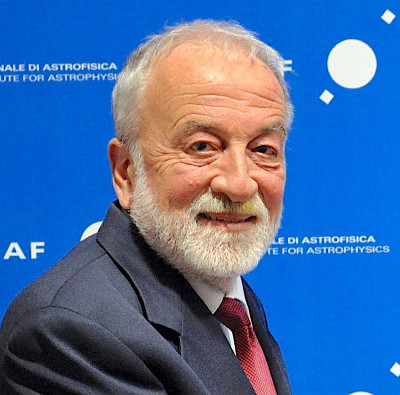 Nicolò "Nichi" D'Amico (Photo courtesy of INAF)
Nicolò "Nichi" D'Amico (Photo courtesy of INAF)
Nicolò “Nichi” D’Amico
Contributed by Andrea Possenti
As a consequence of a sudden and completely unpredictable event, Prof. Nicolò "Nichi" D'Amico, died in his house in Soleminis (Sardinia, Italy) on 14th Sept 2020. He was born in Palermo in June 1953. His first steps in astrophysics were in the context of the just launched ESA satellite COS-B and the related first observations of the sky in the gamma-ray band. After the Degree in Physics at the University of Palermo in 1977, in 1981 he obtained a permanent position at the local University.
A big scientific change in his career occurred in 1985, when he visited the CSIRO in Sydney, Australia. There, he started working on the radio pulsars, which became the focus of his studies for the subsequent 20 years. Several experiments were designed and then implemented at the Parkes radio telescope, and the role of D'Amico in them became progressively more and more important. In particular, after the installation of the Multibeam receiver, these activities reached the peak with the Parkes Multibeam experiments (1998-2004), of which Nichi D'Amico was a senior leader, with Andrew Lyne and Dick Manchester. In the end it was the most fruitful pulsar survey ever, counting more than 800 new sources, and ended with the breakthrough discovery of the J0737-3039 system, the still unique binary including two pulsars. That gained the cover of Science and was listed among the 10 most notable discoveries in Physics of 2004.
D'Amico also revived the pulsar investigations at the Northern Cross Radio Telescope in Medicina (Bologna, Italy), by implementing in the early 1990s a new data acquisition system, including on-line processing equipment. He was also among the promoters of the first pulsar collaboration in Europe during the 1990s, which fully developed later in 2006, with the establishment of the European Pulsar Timing Array (EPTA), which D'Amico was one of the founders of. He was the supervisor of several PhDs, who, under his guidance, eventually created the core of the Italian pulsar community. Prof. D'Amico obtained several prizes: the "CSIRO Medal" in 1993, the "Targa Giuseppe Piazzi" in 2005, and the prestigious "Descartes Prize" for European scientific collaborations granted in 2005 to the aforementioned "Pulse" collaboration for pulsars, to which Nichi belonged as one of the leaders.
On the academic side, prof. D'Amico moved first from Palermo to the Bologna Astronomical Observatory, where he took a position of Associate Astronomer (1995-2001), and then to the University of Cagliari (in Sardinia), first with a position of Extraordinary Professor and finally, since 2005, with a Full Chair Professorship.
In 2002 he became Director of the Astronomical Observatory of Cagliari (2002-2010), and later, Director of the project for the construction of the Sardinia Radio Telescope (SRT), a 64 m single dish radio telescope with an active surface. In fall 2015, he was appointed by the Italian Ministry for Science and Education as President of the Italian National Astrophysical Institute (INAF), and in Jan 2020 he was confirmed for a second mandate.
During his career, D'Amico combined his visionary capabilities with uncommon (for a scientist) managerial attitudes, and also fully exploited his ability in interacting with the Institutions and the political decision makers. That allowed him to first finalize the SRT construction, and then to improve the role of INAF in several transformational projects (CTA, ELT, SKA, etc). All of that with an eye constantly looking to the technological transfer, outreach and educational activities. He always had great attention to young students and trainees, and, as INAF President, he put many efforts at securing new permanent positions for young researchers, thus achieving the largest growth of the INAF scientific staff ever experienced. He will be remembered for his valuable contributions to Italian and international radio astronomy and for his role in the astronomical developments in Italy.
![[IAU logo]](iau_wb_thumb.jpg)
![[URSI logo]](URSI-logo-thumb.jpg)
![[Karl Jansky at his antenna]](jansky_photo_02_thumb.jpg)
![[Reber's Wheaton antenna]](Reber_Telescope_Wheaton_thumb.jpg)
![[Dover Heights]](Dover_Heights_02_thumb.jpg)
![[4C telescope]](GB61-195_4C_telescope_thumb.jpg)
![[Ewen and horn antenna]](ewen_horn1s.jpg)
![[Dwingeloo, 1956]](Dwingeloo-1956-thumb.jpg)
![[Jocelyn Bell Burnell and Cambridge antenna used in pulsar discovery]](burnell2_thumb.jpg)
![[Lovell Telescope at Jodrell Bank]](site_1594_0001-500-334-20180316163019-thumb150.jpg)
![[Wilson, Penzias, and Bell Labs horn antenna]](wilson-penzias-horn_thumb.jpg)
![[6-m Millimeter Radio Telescope in Mitaka, Japan]](6m-thumb.jpg)

